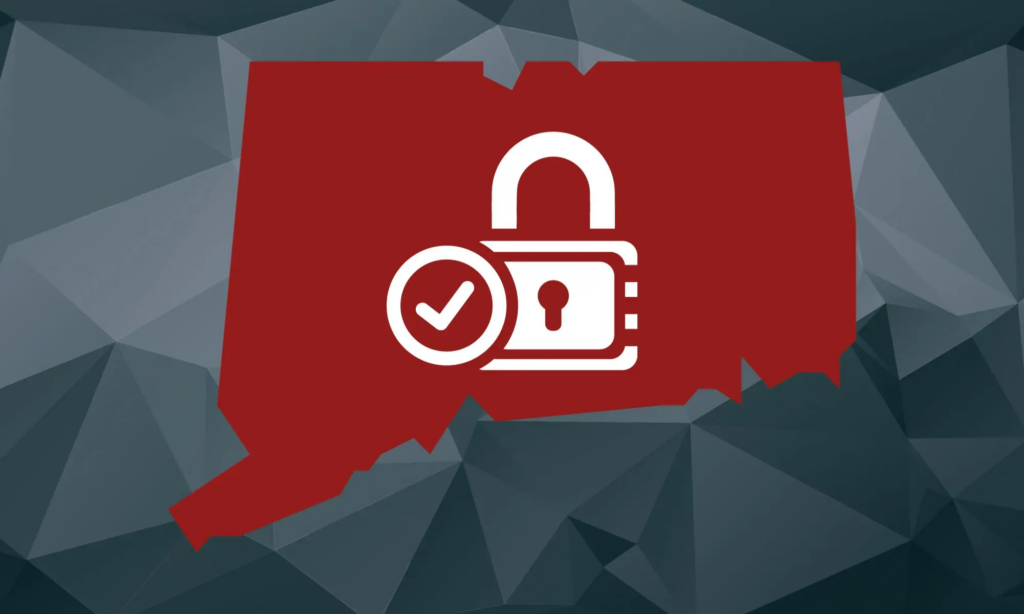
The Connecticut Data Privacy Act (CTDPA) is a new regulation on how businesses should handle personal data. It’s important for you to know about this if you don’t want to get fined.
In this guide, we’ll explain what the CTDPA is, why it matters, and what businesses need to do.
We want to make it easy for businesses to understand and follow the CTDPA. By the end, you’ll have a clear idea of how to make sure your business is doing things right.
Let’s dive right in.
Key Takeaways
The Connecticut Data Privacy Act is a pretty big deal for any business dealing with Connecticut citizens. It lays out a bunch of rules on how to handle people’s personal information and data.
Businesses need to follow the law, or they’ll get slapped with some hefty fines. But it’s not just about avoiding fines, it’s about maintaining trust with consumers and protecting your reputation.
Working with professionals who know the ins and outs of the CTDPA can make things a lot smoother. Here at Captain Compliance, we want to help businesses understand what they need to do to follow the CTDPA and keep themselves and their consumers protected.
What is the Connecticut Data Privacy Act?
What is the Connecticut Data Privacy Act.jpg
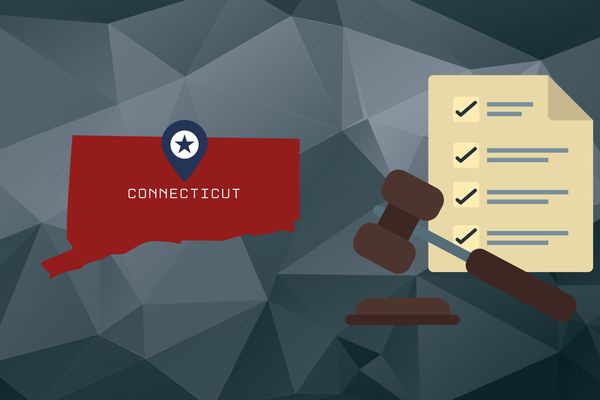
Connecticut passed a new privacy law called the CTDPA that gives people more control over their personal data. It went into effect on July 1st, 2023, and the goal is to empower residents in Connecticut and make businesses more accountable for how they handle their information.
CTDPA was signed back in May 2022 because more states wanted their own data privacy laws. This is good for consumers but tricky for businesses now having to follow different rules in different states.
The law applies only to Connecticut residents acting on their own behalf, not employment or commercial contexts.
It lets them see what data businesses have on them, fix mistakes, delete it, or transfer it somewhere else if they want. People can also opt out of businesses selling or using their information in specific ways.
There are many similarities between the CTDPA and other state laws, like in California and Virginia.
But Connecticut added some unique parts, too. For example, businesses have 60 days instead of 30 days to report a data breach, and there are different specific requirements in order to be under the scope of the CTDPA as opposed to the CPRA. And they have to keep people’s information secure and get consent sometimes.
The law doesn’t apply to every business in Connecticut, though. State agencies, schools, and some others are exempt. However, most businesses need to follow the CTDPA’s rules. We’ll talk about this more in the next section.
Who Needs to Follow the Connecticut Data Privacy Act?
Who Needs to Follow the Connecticut Data Privacy Act.png
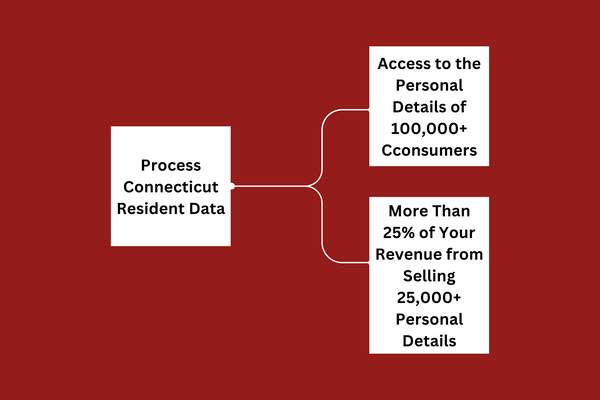
This law is for businesses and organizations that process Connecticut resident data or sell things to people living there. But it’s not for just any business – there are some specific nuances to be aware of.
If your business had access to or used the personal details of at least 100,000 consumers in the past year, you’re covered by the law. But it doesn’t count if you only used their data to process payments and whatnot.
Second thing, if your business had access to or used at least 25,000 people’s personal details, and you got more than 25% of your revenue from selling their information, the law also applies to you.
So, in a nutshell, if you’re a bigger business handling a decent amount of customers’ private data, especially if you make money off it, then you likely have to comply with the new Connecticut law.
Exemptions to Connecticut Data Privacy Act
Not all organizations have to follow the CTDPA. Some are exempt. Here’s a list of businesses that don’t need to worry about this law:
State agencies: These are parts of the Connecticut government.
Nonprofit businesses: Groups that don’t work to make a profit.
Higher education institutions: Places like colleges and universities.
National securities associations: These are registered under the Securities Exchange Act of 1934.
Financial institutions: And data that follows the Gramm-Leach-Bliley Act.
Health-related entities: Those that are under the provisions of the Health Insurance Portability and Accountability Act (HIPAA).
Connecticut Data Privacy Act Principles of Processing
Connecticut Data Privacy Act Principles.png
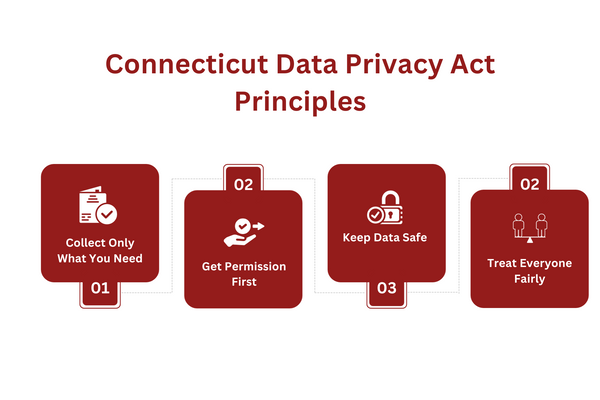
When businesses handle personal data, they have to follow some important rules. These rules make sure that people’s data is safe and used in the right way. Let’s dive into these principles.
Collect Only What You Need
Businesses should only collect the data they really need. They shouldn’t gather more information just because they can. They should always think about why they need the data.
Get Permission First
If a business wants to use someone’s data for a new reason, they must ask first. They can’t use it for things that aren’t needed unless the person says it’s okay.
Businesses have to be extra careful with data from young people. If someone is between 13 and 16 years old, businesses can’t use their data for things like ads without asking them. And for even younger kids, businesses need to ask their parents.
Keep Data Safe
It’s super important for businesses to keep data safe. They should have strong data security measures to protect them from any harm. This includes having proper access controls, encryption of data, software update protocols, and other relevant points.
Treat Everyone Fairly
If someone asks about their data or wants to change something, businesses shouldn’t treat them differently because they want to exercise their rights. Everyone has rights, and businesses need to respect them.
In the case of children (Connecticut residents under 18 years old), you must also give them the right to unpublish or delete their accounts%20and%20delete%20their%20accounts.) on social media platforms.
Connecticut Data Privacy Act Rights
Connecticut Data Privacy Act Rights.jpg
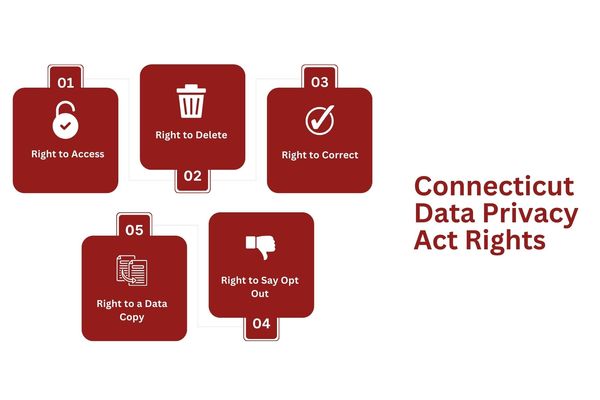
People have rights when it comes to their personal data. The Connecticut Data Privacy Act makes sure of that. This law gives people more control over their data. Let’s look at these rights one by one.
Right to Access
Consumers have the right to ask businesses if their data is being processed and if so, what info they’ve gathered on them. The business has to spill the beans on everything they have, why they wanted it, and who else knows about this.
This helps people understand how their personal information is being used. Knowing this builds trust between consumers and businesses.
Right to Delete
If someone doesn’t want a business to have their data anymore, they can ask the business to delete it.
The business should then remove that person’s information. This gives people a fresh start with their privacy. It empowers individuals to control their digital footprint. By doing so, they can ensure their personal data doesn’t linger where it’s not wanted.
Right to Correct
Sometimes, the data a business has might be wrong. People have the right to ask the business to fix any mistakes in their data. It’s important for data to be accurate and up-to-date in certain cases.
Right to Say Opt Out
People can tell a business that they don’t want their data processed – this includes targeted advertising, the sale of personal data, and automated profiling. The business must listen and not process that person’s data. This ensures that personal data isn’t shared without permission.
Right to a Data Copy
If someone wants to obtain their data in an easily accessible and readable format, they have the right to do so. The business must give them their data in a way that’s easy to access and without hindrances.
Checklist for Businesses to Comply with the Connecticut Data Privacy Act
Navigating the world of data privacy can be tricky. But for businesses in Connecticut, there’s a new guide to follow: the Connecticut Data Privacy Act (CTDPA).
This act sets clear rules on how businesses should handle consumer data. Let’s dive into a detailed checklist to help businesses stay on track.
Consent Mechanisms
Getting consumers okay is a big deal before grabbing any of their information. You can’t just throw up a little box and call it good – they need to really know what they’re getting into.
So explain it simply and clearly: no hiding stuff in the fine print walls of text. And don’t forget to keep good records that they say it’s ok to take their details. That way, no one can say you just took it without asking, and you must cover your bases.
Create a Privacy Notice
A privacy notice is not just some document that businesses have to post. It’s an essential document that lets consumers know how their information will be used. Businesses should put it front and center on their site so it’s easy to find.
The notice has to be super clear about what data is being collected and why, and don’t just say we collect information to improve our services. Get specific. Tell people exactly what info you’re gathering and what you plan to do with it. Transparency is key.
And don’t just set it and forget it! You must update that thing regularly. If you make any changes to what kinds of data you collect or how you use it, put it in the notice. The bottom line is that a solid privacy notice shows consumers you respect their data. It builds trust.
Processor Agreements
When businesses work with outside groups to handle their data, they must be really careful. It isn’t just about passing around the data- it’s making sure those third parties treat the data properly and don’t abuse it.
That’s why they got these processor agreements. These lay it all out, and it makes sure both sides know what’s expected. As the business grows and changes, what they need around data is going to change, too. Regular reviews ensure that the agreement always reflects the current reality.
Conduct Data Protection Assessments
Before diving into any data processing, businesses should take a step back. They need to assess the risks and benefits. This isn’t just good business practice; it’s a requirement of the CTDPA.
By conducting regular data protection assessments, businesses can identify potential risks. This could be anything from a weak point in their security system to a new type of data that might be sensitive.
Once these risks are identified, businesses can take steps to mitigate them. This could be anything from strengthening security measures to deciding not to collect a certain type of data.
Manage Data Breach Notification Protocols
Data breaches can really put a business in hot water. But if you’re prepared, they don’t have to turn into a total nightmare. The CTDPA says businesses need to tell affected consumers if their information gets stolen or exposed within 60 days and without unreasonable delay.
So, first things first, have a solid plan ready to go if a breach happens. That means being ready to figure out the breach occurred and let consumers know ASAP if they’re impacted.
Also, businesses should check that plan regularly and update it when needed.
Implement Data Security Measures
Protecting consumer data is really important these days. Businesses must make sure they have good security to keep that data safe. They need to encrypt it and check their systems all the time to build a fortress around the data.
And they can’t just do it once and be done – they must keep reviewing the security and updating it as new threats pop up. Cybercriminals are always trying to get around the latest protections, so businesses must constantly be ready with new defenses.
And it’s not easy, but it’s very necessary. Sometimes, consumers will bail if they think their data isn’t secure. So it’s a huge priority for businesses now to lock that data down tight.
Train Employees
Data privacy isn’t just the responsibility of the IT department. Every employee should be trained on the ins and outs of the CTDPA. Regular training sessions can ensure that all employees know how to handle consumer data responsibly. It’s about creating a business-wide culture of data privacy.
Moreover, businesses should also have a system in place to monitor and enforce these rules. Regular checks can ensure that all employees are following the rules.
Maintain Records of Data Processing Activities
Good record-keeping is so important for businesses today. You must document everything you do with personal data, and it’s not just to follow the law but to protect yourself against potential legal action, too. When you keep good notes on how you use data, you can show consumers you’re playing by the rules. It builds trust.
You can’t just write this stuff down once. As your business grows or changes what it does, you must update the records.
Keeping real detailed notes is an ongoing thing. The bottom line is detailed records = transparency and proof you’re following the rules. Do it right from the jump and keep at it. That’s how you build trust in this day and age.
Partner with Captain Compliance
Data privacy is complex. But businesses don’t have to navigate it alone. By partnering with experts like us at Captain Compliance, they can ensure that you’re always on the right track. Captain Compliance can offer everything from legal advice to compliance software solutions for your business.
It’s about having a trusted partner in the complex world of data privacy. Moreover, by partnering with experts like us, you can stay ahead of the curve. You can be ready for any changes or updates to the CTDPA.
Penalties for Non-Compliance with the CTDPA
If they don’t follow the Connecticut Data Privacy Act, it could cost them big time.
If businesses don’t follow the law closely, the Connecticut Attorney General’s (AG) office can hit them with fines of up to $5,000 for each violation, and that can add up fast if there are hundreds or even thousands of of violations! The AG can also make the business give back any profits it gets by breaking the law.
At first, the law is a bit forgiving. From July 1, 2023, to December 31, 2024, if a business makes a mistake, the Attorney General will let them know with a warning.
The business then has 60 days to fix it. But after January 1, 2025, things get stricter. The Attorney General might not give businesses those 60 days to make things right. They’ll decide based on how big the mistake was and other things.
The CTDPA is just one of many new data privacy laws popping up. Other states already have their own rules, and more are coming down the pike. Businesses really need to stay on top of all these laws and requirements. It’s a lot to keep track of, for sure, but it’s important they make the effort. After all, this is about protecting people’s personal information from misuse and abuse.
Closing
Data privacy, including regulations like GDPR and CCPA, is a big deal these days. It’s more than just following rules like GDPR and laws like CCPA – it’s about building trust between businesses and consumers, especially when it comes to data subject rights. Keeping up with all those privacy rules can be tricky!
That’s where our team at Captain Compliance and our compliance services come in. We know the Connecticut Data Privacy Act in and out, and we can help any business through our outsourced compliance services, so you can be sure you’re following the rules.
So, if you’re a business that wants a hand getting up to speed on CTDPA rules, contact us! Let’s work together to keep personal data safe. You know what they say – better safe than sorry. Get in touch, and we’ll help steer you through this privacy maze.
FAQs
What is the main goal of the Connecticut Data Privacy Act?
The Connecticut Data Privacy Act (CTDPA) aims to give people in Connecticut more control over their personal data. It sets rules for businesses on how to handle and protect this data.
Want to dive deeper into the CTDPA? Captain Compliance is here to guide you!
Does the CTDPA apply to all businesses in Connecticut?
No, not all. The CTDPA mainly targets larger businesses that handle a significant amount of personal data, especially if they profit from it. But there are some exemptions, like state agencies and nonprofits.
Unsure if your business falls under the CTDPA? Reach out to Captain Compliance for clarity!
What can happen if my business doesn’t follow the CTDPA rules?
If businesses don’t comply, they can face fines from the Connecticut Attorney General’s office. Initially, there’s a grace period to fix mistakes, but after January 1, 2025, penalties can get stricter.
Concerned about staying compliant? Read our guides!
How does the CTDPA compare to other state data privacy laws?
The CTDPA shares similarities with laws in states like California and Virginia. However, Connecticut has added its unique features, differentiating itself from these laws, so it’s important to read and acknowledge the nuances.
Have customers in multiple states like California? Read our guide on CCPA requirements!